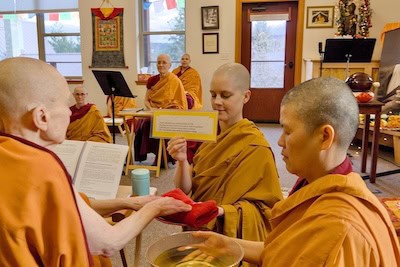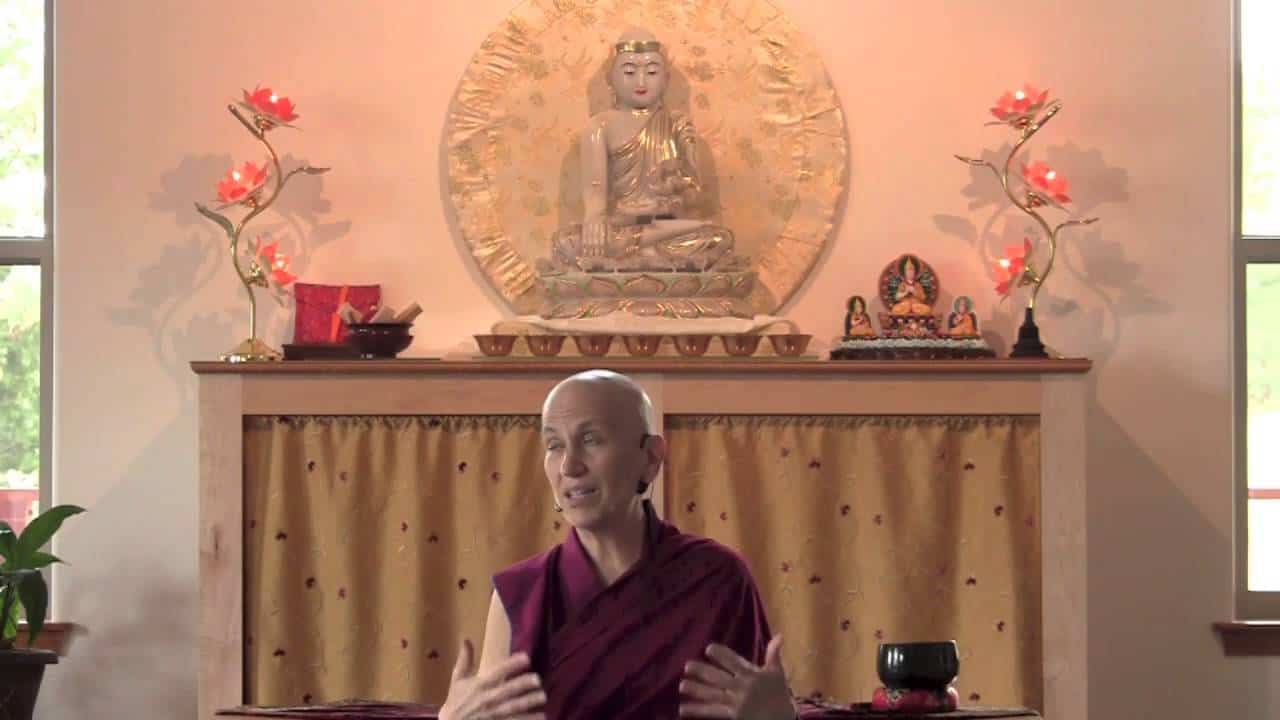What matters at the time of death
Part of a series of teachings on the text The Essence of a Human Life: Words of Advice for Lay Practitioners by Je Rinpoche (Lama Tsongkhapa).
- Thinking about what will be of benefit at the time of death
- Gradually applying this teaching to things we are emotionally reactive to
- Enlarging our view to see what will really be beneficial in the long term
- Taking responsibility for our behavior, but not other people’s actions
- Having a heart of love and compassion
The Essence of a Human Life: What matters at the time of death (download)
Death will definitely come and will quickly come.
Should you neglect to train your thoughts
again and again on such certainties
you will grow no virtuous mind,
and even if you do, it will be spent
on enjoyment of the glories of this life.
We talked about that, didn’t we? So we were on the next one:
Think, therefore, upon seeing and hearing of others’ deaths,
“I am no different, death will soon come,
its certainty in no doubt, but no certainty as to when.
I must say farewell to my body, wealth, and friends,
but good and bad deeds will follow like shadows.
This point, I think, is a really important one. At the end of our life, what is going to matter? Because if we look at things from the viewpoint of “at the end of our life, what are we going to take with us to the next life?” that will help us really clarify our priorities and get our mind clear. If we look at life from the viewpoint of “what will benefit me to have happiness today?” we come up with totally different conclusions.
What will benefit me to have happiness today? Well, we all know that, don’t we? Eat this, and be with friends, and do this, and that, and the other thing. Ethical conduct doesn’t play any part in it because we’re only looking for the happiness today. Getting angry at people who interfere with our happiness makes perfect sense from the viewpoint of today. And so we just kind of go through life that way.
If we look at our life from the viewpoint of death, and what will we have to take with us, then if you look at the situations we’re in today where you’re craving something and you’re really wanting something so badly, then at the end of your life will getting that or not getting that make a big difference?
At first try that with small things. If I eat this or don’t eat that will it make a difference at the end of my life? Absolutely not. This is something I’m not even going to remember probably in a week, let alone a day.
But then go deeper into things where you have much more emotional reactivity and ask yourself how important is this issue considering that one day I’m going to die, and what do I take with me. My karma, my Dharma practice. So here I am today and I’m very mad at somebody, somebody did something blah blah blah…. Is that really something that, at the time I die, I want to be thinking about? At the time I die, looking back on my life, is it going to be really important that I clarify the situation with this person, and work out all the details about this incredible sticky emotional situation, is that really important at the time I die?
You have to see. Because some things we say, “Oh, that is really important to me.” But then other things we look, and when we look at them from the point of view that we’re dying it’s like, “Okay, somebody did something that I don’t like, and they talked behind my back, and they did blah blah, and that’s adversely affecting me, but you know, it’s not a big deal.” Yes? “And I really don’t need to make it into a big deal. And if I live to be 80 and I look back on this situation is it going to be a big deal that this person said this and that and the other thing and did this and that and the other thing?” Yes? Is it? Or is it something….
When you make the framework bigger, you enlarge your framework, and you say, “Is this really such an important thing?” Then your whole perspective shifts. And, “Okay, certain people don’t approve of me. What to do? The basic thing is I can’t change them, but I have to make peace about the situation in my own life.” Or, “Somebody’s mad at me.” Again, “Oh no, I didn’t please that person, somebody broke the first rule of the universe and they don’t like me…. And I’ve got to fix it all up because everybody has got to like me….” Then you step back and you say, “Is everybody liking me really so important?” My behaving poorly to somebody is important, because if I behave poorly, I create negative karma. So I’m responsible for my poor behavior. I need to purify that. I may need to apologize to somebody. But somebody else being mad at me, and me feeling hurt because they don’t like me and I want them to like me, and I want to be close to them but they don’t want to be close to me…. That part of it is not really so important.
Are you getting what I’m saying? Our behavior—what we’re saying, what we’re doing, what we’re thinking—is creating karma. That is important. Because that will go with us to the next life. But in the same situations, how people are responding to things, that we can’t control. And that’s not so important. “Somebody doesn’t like me….” Well, we could probably start a whole Facebook page on the people who don’t like me. This is not an uncommon event in this world. Even though it broke the first rule of the universe. It’s not an uncommon event. And, you know, I think I might survive it. I survived all the people in 1st grade who didn’t like me. And the people in 2nd grade who didn’t like me. We survived all of that, didn’t we? So why now is it so important that I do backflips, and become a people-pleaser, and try and do whatever? It’s not that important.
What’s important is I’m responsible for my behavior and I don’t, with any intention, cause harm. That’s what’s important. And if I have anger or resentment in me, that’s what I need to work on is my anger and resentment. Their response I don’t want to be thinking about at the time I die, really.
I find that way of looking at things very helpful to get me to put things in perspective and see when my mind is spinning, and making such big deals out of things that are not big deals…. And how my mind can spend months and years making big deals out of things, let alone days and weeks. Spend my whole life like that, you know?
Our responsibility is to settle our own emotions and act with integrity. And there may be some relationships where we have to be honest and our emotions are not settled. But we need to work on that in our practice, to settle them. Sometimes you can go and talk about it with the other person. But it depends what the situation is. The main thing is we have to settle it inside.
And how do we settle that? Having a heart of love and compassion. That’s it. Cutting the rope of our attachment and anger to other people. That frees them and it frees us. Because if we don’t do that, then I’m going to be worrying about things that happened…. “10 years ago Venerable Tarpa said this to me…. And Venerable Semkye said that to me…. And it’s in my mind still now. Do you remember that day out in the garden when you said blah blah, and I said blah blah, and I’m still so upset about it….” That is my problem. That is my problem. Leave her alone. She doesn’t even remember the situation.
You getting what I’m talking about?
Venerable Thubten Chodron
Venerable Chodron emphasizes the practical application of Buddha’s teachings in our daily lives and is especially skilled at explaining them in ways easily understood and practiced by Westerners. She is well known for her warm, humorous, and lucid teachings. She was ordained as a Buddhist nun in 1977 by Kyabje Ling Rinpoche in Dharamsala, India, and in 1986 she received bhikshuni (full) ordination in Taiwan. Read her full bio.


